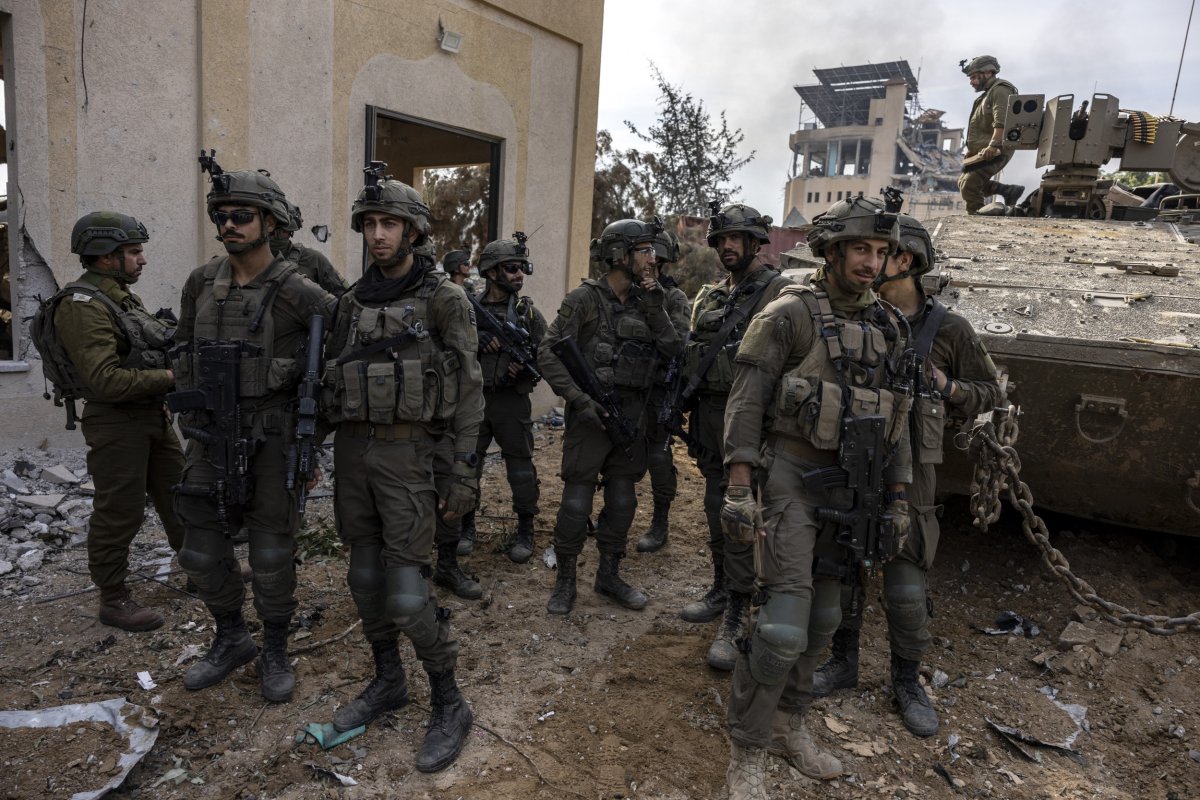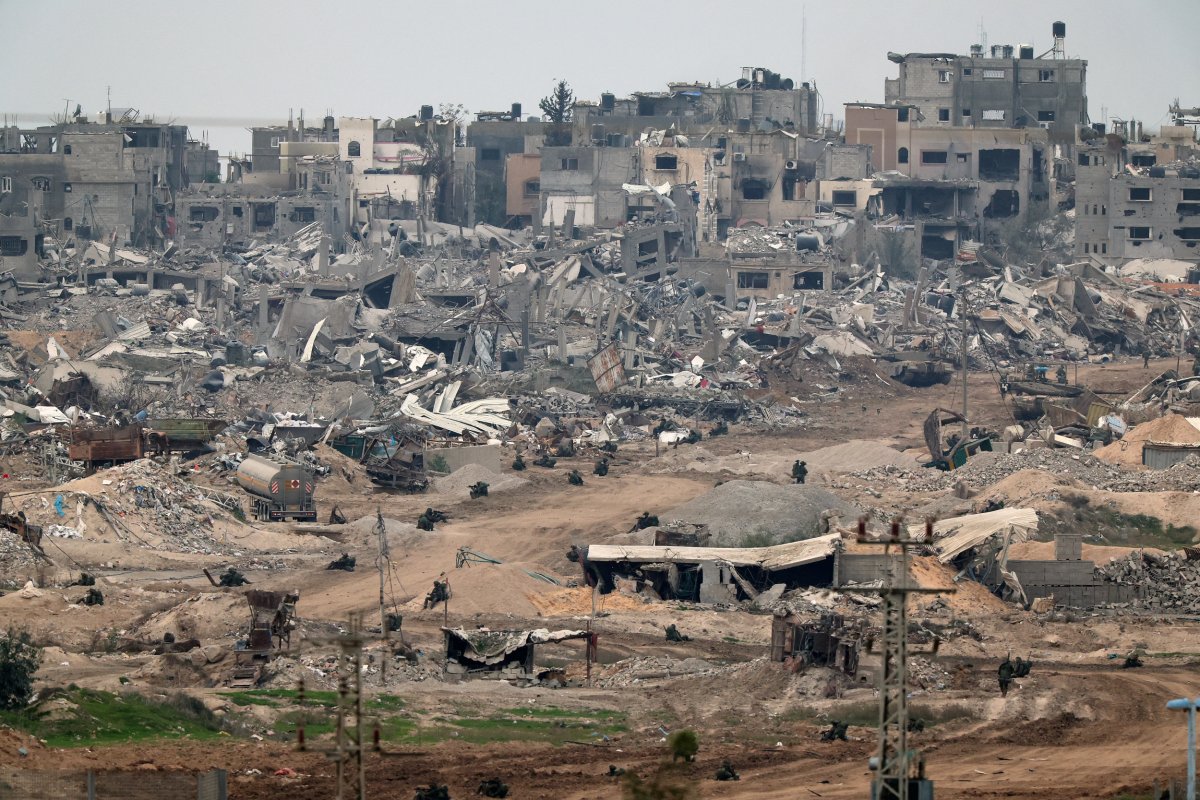David Brennan
Israel's war on Hamas and other Palestinian militant groups in the devastated Gaza Strip will not end any time soon, according to a former national security adviser to Prime Minister Benjamin Netanyahu, even if the operation does transition to a less intense phase over the coming months.
Yaakov Amidror, who served as Netanyahu's national security adviser from 2011 to 2013, told Newsweek during a Jerusalem Press Club briefing on Thursday that Israeli operations in the Gaza Strip will continue through 2024.
"It will not be ended within the year," Amidror explained. "A year from now I believe that Gaza will be 'cleaning up,' and we can pull out our forces and come in only if someone begins to build a threat against Israel."
"The year 2024 will be dedicated to cleaning Gaza," Amidror added. "It will mean—every day—raids into Gaza by our forces." Israel Defense Forces (IDF) and intelligence services strike groups, he said, will look to "destroy" targets linked to top Hamas leaders and the group's infrastructure, such as weapons depots and tunnels.

This picture taken during a media tour organized by the Israeli military on January 8, 2024, shows soldiers during operations in al-Bureij in the central Gaza Strip, amid continuing battles between Israel and the Palestinian militant group Hamas. Israeli leaders have vowed to annihilate the organization.
Raiding forces will stay for however long "is needed to destroy" said targets, Amidror said, after which they will return to Israel. "And in the same night, other forces will go to another place to destroy it," he added.
"The whole year will be dedicated to cleaning Gaza," Amidror explained, noting Israeli leaders "will not hesitate" to extend the operation into 2025 if needed.
Contacted for comment, the IDF Spokesperson's Unit referred Newsweek to a December address given by IDF Chief of the General Staff, Lieutenant General Herzi Halevi, who said the "complex" campaign "will continue for many more months, and we will operate in various ways—so that the achievement will be preserved over time."
"There are no magic solutions or shortcuts in the fundamental dismantling of a terrorist organization, except persistent and determined fighting, and we are very, very determined. We will also get to the Hamas leadership, whether it takes a week or months."
Israel's operation was launched in early October in response to the surprise Hamas infiltration attack that killed some 1,200 people and saw hundreds taken back into Gaza as hostages. Around 100 people are still believed held by various militant groups in the besieged territory.
The IDF's "Operation Swords of Iron" has so far killed more than 24,000 Palestinians, per figures published by the Associated Press, with around 85 percent of the Strip's 2.3 million people displaced.
Israeli forces have taken control of large parts of northern Gaza and are continuing operations in the south of the Strip. Fierce fighting is ongoing around the southern city of Khan Younis, while militants have also launched attacks on Israeli forces conducting clearing operations in the partially occupied northern portion of the territory.
Israel is yet to capture or kill its two main Hamas targets: Yahya Sinwar, the group's leader in Gaza, and Mohammed Deif, the commander of Hamas' Izz ad-Din al-Qassam Brigades. Its forces are also yet to free around 100 hostages spread across an unknown number of locations, with the uncertainty over their fate prompting large protests within Israel.
"These coming days will be very important for the continuation of the war in Gaza," Amidror said. "The IDF is now reshaping its control on the ground. The IDF is still very much focusing on the war around Khan Younis."
"There, the job of taking control on the ground was not finished yet, unlike the north and the center," he added. Ultimately, the IDF will be looking to clear Hamas forces and establish a "very strong defense system" around the edges of Gaza, likely in the form of an extensive buffer zone.
Future targeted raids, Amidror said, will be aided by the "huge amount of information" that has been collected by Israeli forces taking control of Hamas territory and command points within Gaza.
Some IDF units are now being rotated out of Gaza for rest and retraining, though Israeli leaders have stressed this is not a sign that the operation is drawing to a close.
With a fresh war against the Iran-aligned Hezbollah militia looming on the northern border with Lebanon, Israel is bracing for a tumultuous 2024. IDF-Hezbollah skirmishes have been underway since October, and Israeli strikes have killed several militia commanders on Lebanese territory.

A picture taken from southern Israel near the border with the Gaza Strip on December 21, 2023, shows Israeli soldiers entering a devastated area amid ongoing battles with the Hamas militant group. Tens of thousands of Palestinians have been killed in Israel's offensive.
Israel wants Hezbollah to withdraw from the shared border per United Nations Security Council Resolution 1701, passed in an effort to end the 2006 war between the two combatants. The resolution prohibits Hezbollah presence south of the Litani River, some 18 miles north of the border with Israel.
Israeli officials have expressed little hope of a diplomatic solution to the standoff, as President Joe Biden's administration scrambles to smother the beginnings of a new conflict that might draw in Hezbollah's patrons in Tehran and its regional network of allies.
Amidror warned on Thursday that a full-scale conflict with Hezbollah would be "ten times more complicated, and hard, and devastating than the war in Gaza. They have much more rockets, missiles, and drones and so on and so forth, I think ten times that of Hamas."
Regardless, he added: "The IDF is very aggressive in its will to fight in Lebanon. This is the dream of many soldiers, to finish with Hezbollah, which is the main threat to Israel."
No comments:
Post a Comment